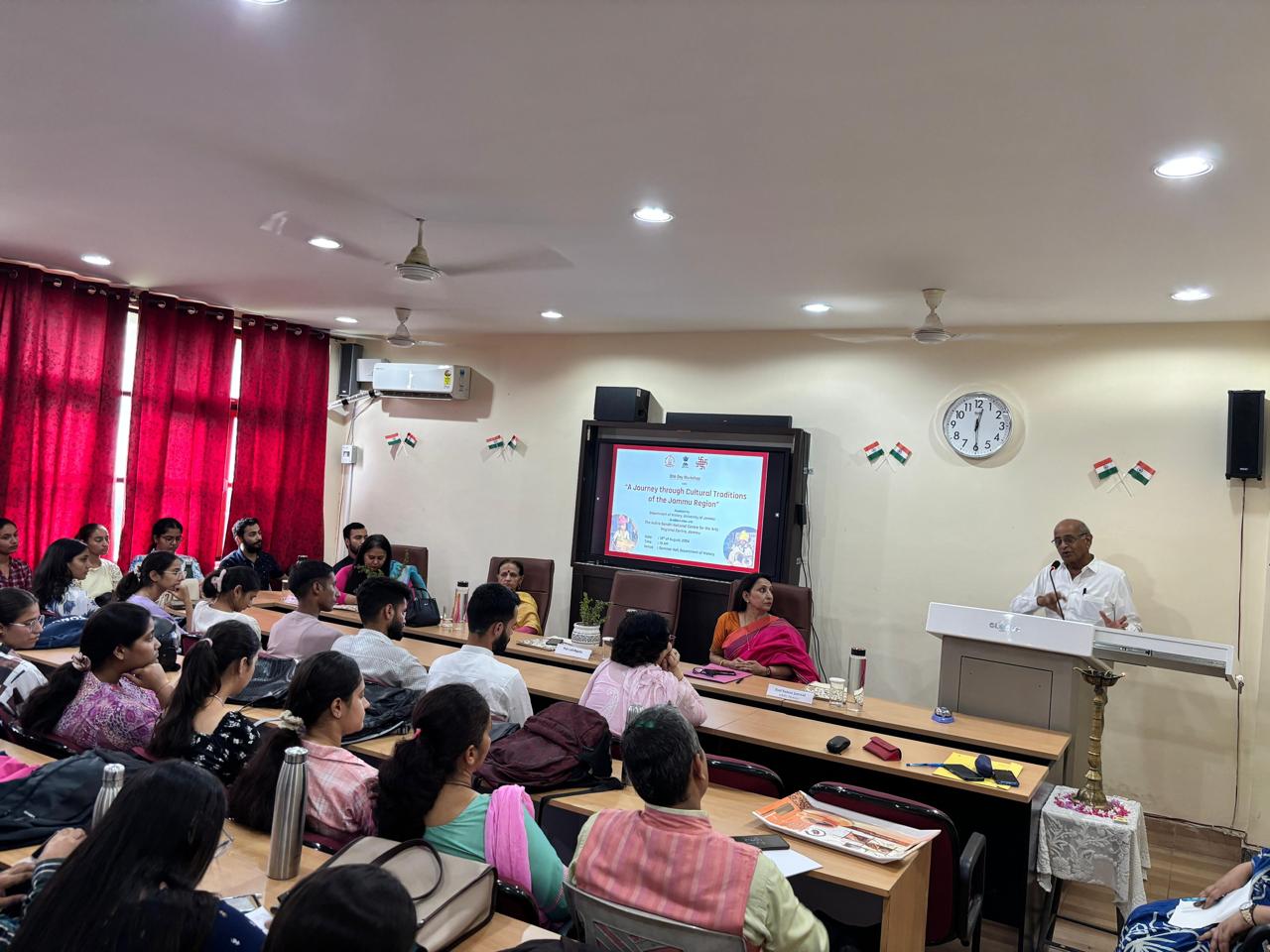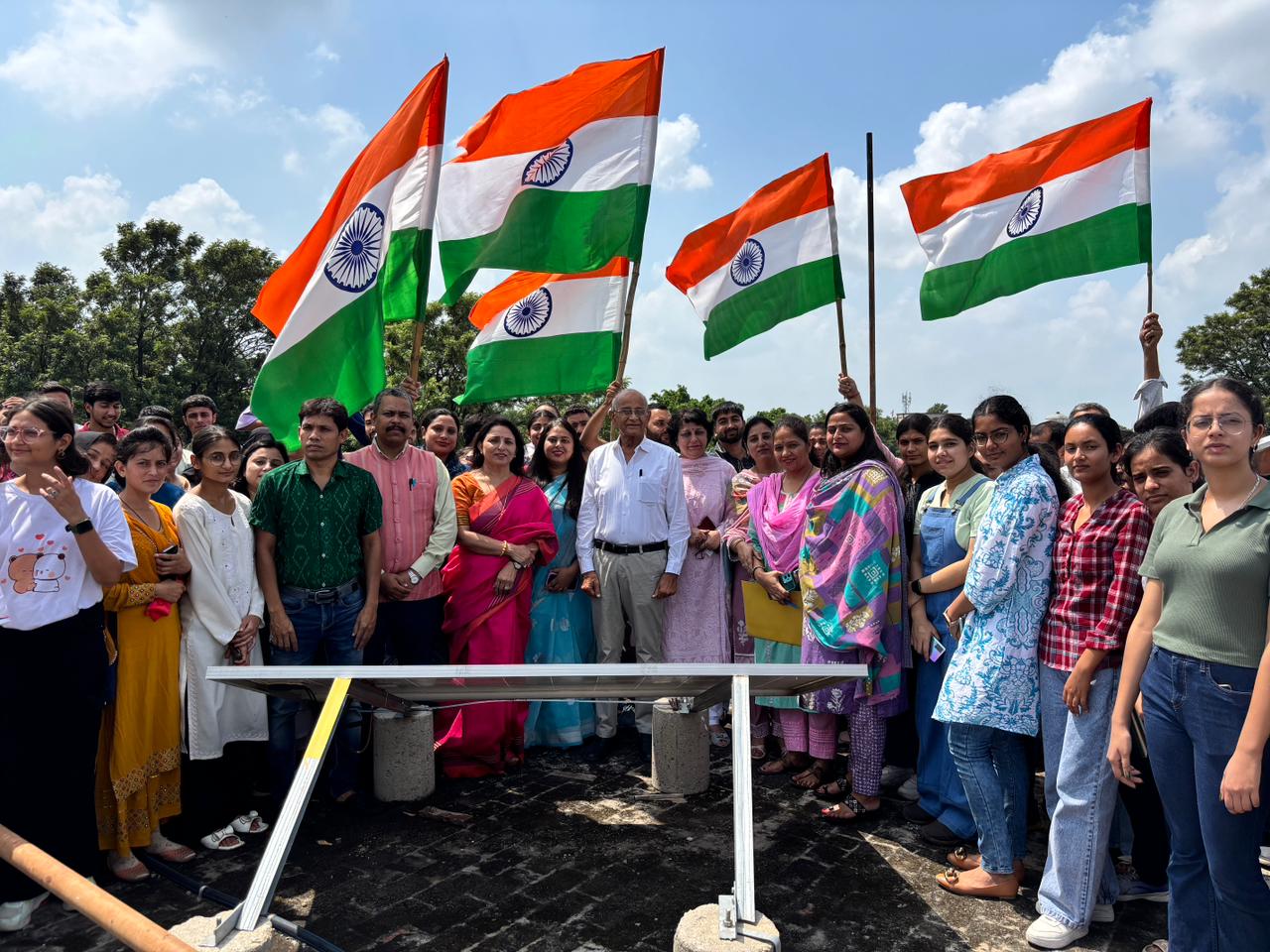About University

Cradled in the lap of mountains at the foothills of auspicious Trikuta, besides the river Tawi at an altitude of 1030 ft. is Jammu. This 'city of temples' has many places...
The Department of History at the University of Jammu, in collaboration with the Indira Gandhi National Centre for the Arts (IGNCA) Regional Centre, Jammu, organized a significant one-day workshop titled "A Journey through Cultural Traditions of the Jammu Region." Held in the Seminar Hall of the Department of History, the event attracted a distinguished audience of scholars, artists, and cultural enthusiasts.
The academic session of the workshop began with opening remarks by Professor Suman Jamwal, Head of the Department of History at the University of Jammu, whose address was both incisive and compelling. Her discourse emphasized the indispensable role that heritage and tradition play in sustaining the continuity of cultural practices and societal values. By providing a thorough analysis of how these elements serve as the bedrock of our cultural identity, she highlighted the profound risks posed by their erosion. Professor Jamwal meticulously outlined the potential ramifications for future generations should these vital aspects of our cultural heritage be lost. Her address not only established a scholarly framework for the workshop but also underscored the urgency of collective action in safeguarding our cultural patrimony. Professor Jamwal advocated for a collaborative approach that involves the concerted efforts of governmental agencies, educational institutions, and members of civil society. This call to action was intended to galvanize stakeholders at all levels to engage proactively in the preservation and enrichment of our cultural heritage amidst contemporary challenges.
This was followed by the address of the chief guest Prof. Lalit Mangotra. In his address he explored the need to transcend academic boundaries and embrace cultural traditions. The discussion highlighted how culture arises from people’s lifestyles and evolves over time, reflecting on the disconnection from traditional practices. A poignant recitation of Mohan Lal’s poem "Kandi" provided insights into the lifestyle of the people from the Kandi belt.
Following the initial presentations, the workshop featured an engaging performance by Mrs. Seema Sehgal, who captivated the audience with her melodious voice and powerful vocals. Her discussion on the role of folk songs as part of intangible cultural heritage illustrated how these songs capture the lives, emotions, and struggles of ordinary people.
An interactive session followed, where participants had the opportunity to engage with the resource persons and discuss methods for preserving local heritage. This vibrant discussion allowed attendees to voice their queries and explores solutions for maintaining cultural traditions.
Following lunch, the session resumed with an engaging and interactive PowerPoint presentation led by Ms. Shruti Awasthi, Regional Director, Indira Gandhi National Centre for the Arts, Jammu. In her presentation, Ms. Awasthi provided a clear and insightful distinction between tangible and intangible heritage. Her meticulous explanation illuminated how these two categories of heritage, while distinct, are interrelated in their contributions to cultural identity. Ms. Awasthi showcased a range of significant temples from the Jammu and Kashmir region, emphasizing their importance as tangible cultural assets. She meticulously detailed the architectural and historical value of these temples, illustrating how they embody the artistic and spiritual heritage of the area. Through her dynamic approach, Ms. Awasthi effectively bridged the conceptual with the practical, reinforcing the importance of recognizing and valuing both tangible and intangible elements in the broader context of cultural preservation.
The session was further enriched by the passionate insights of Professor Shyam Narayan Lal, who took the stage with an impassioned call for a holistic approach to studying cultural heritage. Professor Lal fervently argued that monuments should not be merely admired as architectural marvels, but must be understood within their broader social and geographical contexts. He conveyed that these structures are not isolated relics but are deeply embedded in the fabric of the communities and environments that created them.In his moving discourse, Professor Lal underscored the shared responsibility of protecting and celebrating our cultural legacy, reinforcing the idea that the preservation of heritage is an ongoing, collective endeavor that binds us to our past and to each other.
Insights from Dr. Tirathraj Bhoi enriched the discussion further, as he shared his research from working in Chhattisgarh’s tribal areas. His presentation on the need for better exploration and preservation of archaeological sites in the Jammu region highlighted the importance of comprehensive research in cultural preservation.
Dr. Anju Bala’s detailed overview of local festivals and fairs provided valuable context on their role in Jammu’s cultural heritage. Her presentation showcased the vibrant traditions that characterize the region. Dr. Anu Mankotia discussed the significance of family, food, and folklore in promoting and preserving local culture, emphasizing their role in cultural transmission and identity.
The workshop concluded with a thought-provoking address by Sqn Leader Anil Sehgal, who highlighted the need for continuous efforts to preserve Jammu’s local culture and language. He advocated for the revival and promotion of the Dogri language as a crucial aspect of the region’s cultural landscape.
Mr. Suman Verma, a faculty member of the Department of History, delivered the formal vote of thanks, expressing gratitude to all participants and speakers. The event successfully celebrated the rich cultural heritage of the Jammu region and reinforced the commitment to preserving and celebrating its unique traditions.